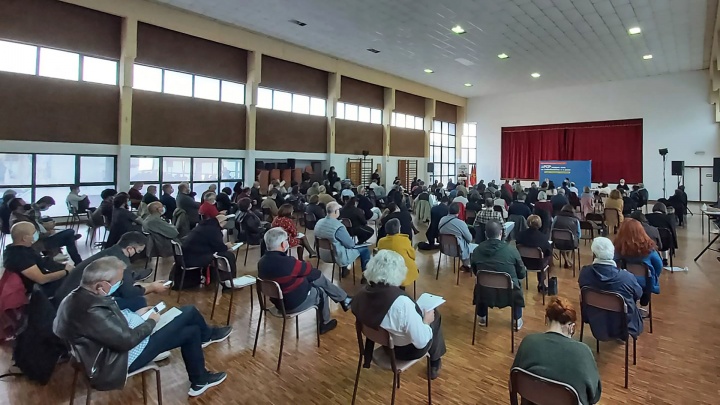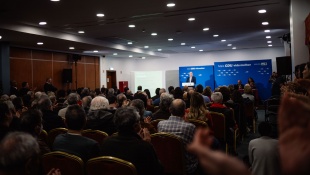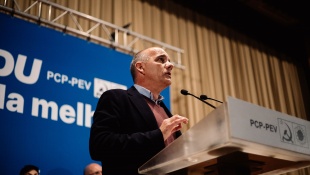We have taken an approach on the next State Budget in a context in which the health situation is far from being overcome, bringing elements of uncertainty on future developments, and in view of the worsening of all economic and social indicators.
We will reach the end of the year with more than 700 thousand unemployed in real terms, with a drop in GDP that, according to the Government's own estimates, will exceed 8%. Public services are subject to enormous pressure, particularly the National Health Service, which, in addition to the epidemic, is called upon to respond to all other needs of the Portuguese people. The situation of loss of wages and income that already affects hundreds of thousands of families today will tend to worsen in the coming year.
The question is not whether or not there is a Budget for 2021, but whether the next Budget, as well as other measures and options that have to be taken, responds, in fact, to what the country needs. To solve structural problems that have been going on for years, or new problems determined by the impact of the epidemic.
Life has made particularly clear the need for a global response to the situation of the country, with urgent measures for the valorisation of the workers and their rights, including wages, reinforcement of social protection, support for national production and productive sectors, increase in public investment and responsiveness of public services, reduction of external dependence in various fields of national life, public control of companies and strategic sectors.
The Government's options are not going in that direction, as shown by the adoption of the Supplementary Budget determined by benefits to economic groups and harm to workers.
The Budget proposal that the Government submitted to the Assembly of the Republic, incorporating some convergence, very partial and limited, with the proposals that we presented, does not respond in fact to the requirements of the country. A closer reading of the document confirms an aspect to which we drew attention: the answer to national problems is not compatible with the trajectory of reducing the deficit of public accounts that it contains.
The option to give priority to cut the deficit (three percentage points) and not to the country's needs, a wrong option under any circumstances, becomes particularly serious and incomprehensible in the current situation. An option that, contrary to several international recommendations, denies the country about 6 billion euros, proving that there are resources to respond to what the country needs.
Moreover, we have to remember this. The Government is not only working for the 2021 deficit, it is doing so today, with the postponement and non-compliance of several matters adopted in successive budgets, including in the Supplementary Budget, failing to materialise or adulterate several decisions of the Assembly of the Republic.
It is true that the Government has partially approached some of the many proposals that we put on the table. The increase of all pensions of up to 658€ by 10€ as of January 1, the consideration of the health, hardship and risk allowance for local administration workers or the creation of a new special social allowance. But such commitments are far from guaranteeing that the Budget can be the answer that the country needs.
It is not enough to invoke the seriousness of the situation as the Government does. It is necessary to match words with actions. The dimension of the problems requires solutions to match this seriousness and the country would not understand if this answer was denied.
The PCP's vote of abstention on the budget proposal in general is not an end point. It is above all the expression of the PCP's willingness to not give up waging to the end a battle that seems difficult, especially because of the Government's systematic refusal to respond to what the country needs. We go to the budget specifics with the aim of promoting a broader debate about what the situation requires and the necessary responses. Knowing that you do not respond to an economic recession or to the dynamism of the economy without the increase of wages, namely of the National Minimum Wage.
Striving for the National Health Service to have the necessary means and resources, either to face the epidemic or to respond to everything else that has been left behind and to put an end to the indecent plunder to which it has been subject through the private economic groups.
Demanding specific solutions for the recruitment of workers in sectors and careers where hiring faces greater difficulties, as is the case of doctors and nurses, in addition to broader measures for valorising wages and careers as an indispensable tool for valorising workers and for the improvement of public services.
Intervening to reinforce public services, hiring the thousands of workers that are lacking: in schools, in Social Security, in the justice system, in the security forces and services.
Proposing that workers in essential services be compensated for the special demands of the exercise of their functions by means of a pay supplement that cannot leave out thousands of professionals from the sectors of health, security forces and services, fire-fighters, social facilities, urban cleaning and hygiene, waste collection, water supply and sanitation, and other sectors.
Reaffirming the need to increase unemployment benefits with the extension of its scope, the increase in amounts and the extension of payment terms, an option that is not accomplished with the creation of a new especial social allowance.
The response to the needs of young families and the elderly has to be defined with concrete measures and objectives related to the creation of vacancies in the public network of daycare centres and nursing homes, to be implemented in 2021, and by clearly defining the responsibility of Social Security in both areas.
The productive apparatus, MSMEs, the fisheries and agriculture sectors need specific measures to ensure fair prices for production and at the same time guarantee the articulation between the development of productive activity and measures to increase the purchasing power of the workers and people.
We do not give up fighting for a fair fiscal policy by increasing the Income Tax brackets, relieving the taxation on lower and intermediate incomes, and at the same time putting an end to the flight abroad of economic groups that should pay taxes in Portugal on profits generated in the country.
We will intervene to ensure that access to culture, sport, and the enjoyment of life are not suspended or condemned to disappear in the face of the difficulties posed by the epidemic.
We will intervene so that the country's strategic sectors do not continue to be at the mercy of the interests of monopoly groups. It is necessary to regain public control of CTT [postal service]. Just as it is necessary to regain public control of airports and ensure support for TAP. The situation in the financial sector also requires the strengthening of the public component and the recovery of public control of Novo Banco after having spent more than 8 billion euros on it.
As is urgent and constitutes a national emergency, given the situation of workers and their contribution to the development of the country, a general increase in wages for all workers, the valorisation of careers and professions, the increase in the National Minimum Wage to 850 euros, the repeal of the grievous norms of the labour legislation. These are some of the indispensable solutions that the PCP has defended, solutions that contrast with the limitations of the Budget proposal presented by the Government but that will be present in the debate on the Budget specifics.
The abstention that we announced at this stage of the discussion only allows us to move on to another stage of the discussion. Confronting the PS and other political forces with proposals and options free from the impositions of the European Union and the interests of big capital. The Portuguese workers and people should not be afraid of the threats and blackmail that are made regarding the Budget. What is and will be worrying is if the State Budget and other options of the Government leave the country at standstill while the lives of millions of Portuguese deteriorate.
The country would not understand that in the face of the scale of the problems you persisted in ignoring the answers that are needed. What the country would not understand if you continued to put first the interests of big capital instead of what is necessary to improve the living conditions of the workers and people. What the country would not understand is that instead of giving priority to economic development and growth, it continues to be subordinated to the deficit and the debt, postponing the needed solutions.
On the part of the PCP, in addition to guaranteeing the proposal, the initiative, the voice that will not be absent in this phase of the debate, we also leave here the guarantee that the final vote on the Budget will depend on the evaluation of the final version of the Budget in view of the global response to national problems, as well as the assessment of guarantees regarding the Government's options in fundamental matters in the field of wages, workers' rights or the recovery of instruments indispensable for the implementation of an economic and social development policy at the service of the country. This is our commitment.




